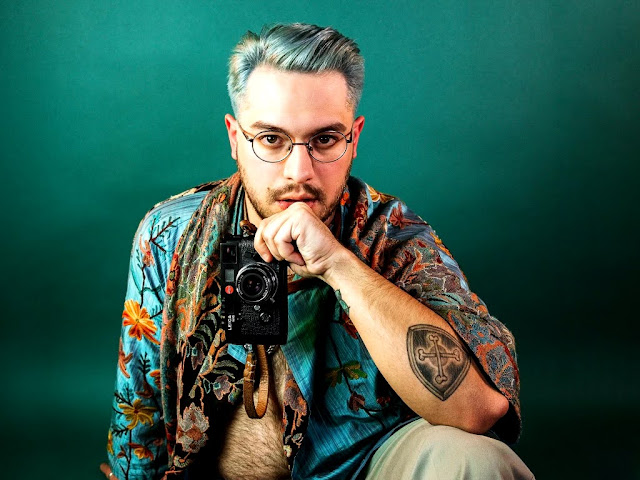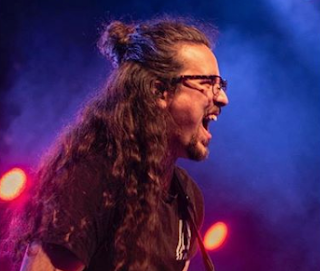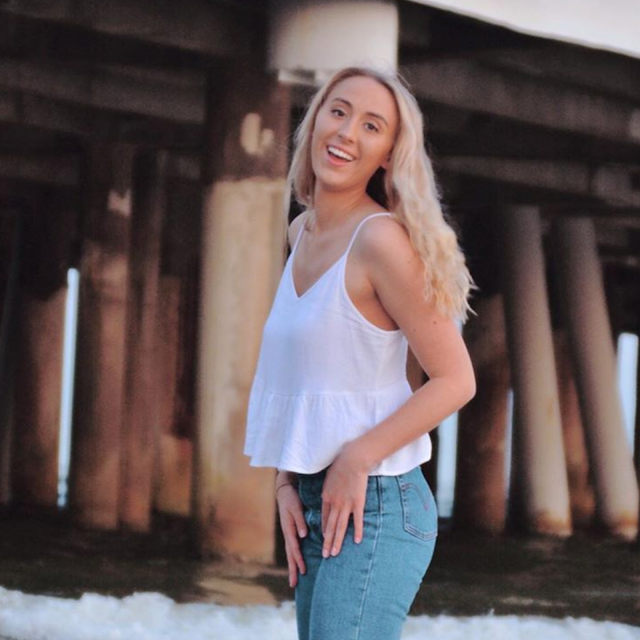Dylan Newton - Interview
In this interview, I hit the jackpot. I got to interview the man who inspired me to start this project, to begin with, Dylan Newton. He's a prolific photographer from Southeast Texas now living in the Austin area. You may know him from Praise Church, Guitar Center, or anywhere else he's worked or volunteered. You may also know him from his more comparatively recent art-style of Cyberpunk. Dylan's really made a name for himself in his field, and we got to have a really nice chat. Dylan and I had the absolute longest interview I have ever done and I loved every second of it. That being said, I had to cut a lot of stuff out, so maybe one day I'll just release the audio file so you can hear us ramble about the question, "Are you human, and does that matter?" in fiction for hours. My ramblings aside, please enjoy.
E: When you started getting more into Cyberpunk photography/art, what do you think gave you the biggest inspirational push to really jump into it?
D: Ooh. I think it was a couple of things, I think several things happened that pushed me in that creative direction. First, around the time "Stranger Things" Season 1 came out, that's when I started to really think about neon as an art tool in a way crazier capacity. I absolutely loved the '80s aesthetic of it. Even though they don't really show neon that much. Second, a big kicker. I watched "Ghost in the Shell". The 1995 animated movie. There's nothing that hits like that version. It is so philosophical and so much going on, that's why I was so pushed by it. Throughout the entire movie, it asks a question: What does it mean to be human, and does that even matter? It proposes the idea that a machine could still be considered human. The main antagonist, the Puppeteer, he started out as a program that eventually gains sentience. He's basically told that he is not sentient because he's 'just a program run by 1s and 0s'. But he retorts by basically saying, 'My code is binary, your code is DNA. We are both defined by our codes, so we're not so different.' That was wild to me. There are other movies that acted as inspirations to me. Akira, Ex-Machina... I'm trying to think of some other ones.
E: Seems to be sort of in the same vane as "Blade Runner."
D: Yes! Blade Runner! Yes!
E: Yeah, or really, "Do Androids Dream of Electric Sheep?"
D: Absolutely. Both "Ghost in the Shell" and "Blade Runner" deal with the same question: "At what point are you human and does that matter?" I think the antagonist of Blade Runner always argues "What is the value of life?" You realize that Deckard Cain is going after these replicants but they are unwilling to die. In Ex-Machina, the same idea comes through. The android in Ex-Machina is unwilling to die. I remember I was taking a Business Ethics class at Lamar, and we watched Ex-Machina. We would talk all the time about the subject, "At what point does a robot have rights?" Are they coded to be unwilling to die, or is that its will? How would you discover if it's real or not? In that sense, what is even the value of real? The philosophy of Cyberpunk is so crazy to me because it's so vague and often doesn't really have an answer. It's subjective. Imagine in the future, we have people who are 98% machine. Do we still call them human? I love that because I can see a reality in that. In my photos, I want to bring out the aesthetic and build a small story with an image. I think that's every photographer's dream.
E: Well, you say you want your pictures to tell a story, and that leads me to this question: The saying goes, "a picture is worth 1,000 words." if someone were looking at one of your pictures, what are some of the words you would hope would come to their minds?
D: Dang, Ethan, that's so good, (laughter). That's got me a little bit stumped, so give me a second. (a moment later) I would hope that an observer would see one of my photos and think: "Is that from Cyberpunk 2077?" (we both laugh). I hope they say, "I want to do this too." One thing I've been so happy about is that people always ask me, "Is this real, or is this all Photoshop?" and my answer is yes and no.
E: You could start asking, "Does that matter?"
D: Yeah! Does that matter? No, not really. It's so much cooler when I can tell people that I actually build some of my pieces.
E: I remember seeing some article on the internet. For the life of me, I can't remember who published it, but the basic thesis was that Photoshop can just add another layer of art to a photo. So long as it's not claiming to be real, then it doesn't really matter if it's Photoshopped, because it's just art.
D: Yeah, that's such a great topic. I was watching a video by Jamie Windsor, and he talks about this. He illustrates this by showing a photo that was taken a while ago. It was of these people walking around and there's this flight of papers that have just come from someone's briefcase. It's a wonderful photo. The thing is, that photo wasn't taken 'in the moment'. It was brought about by amalgamating something like 200 images and interposing them to make the whole image. It was based on an old Japanese painting. The idea was that people valued the process of how it was created. Some people don't get that praise. For instance, there was another photographer that entered a Nikon photo contest. It was a picture of someone shooting from under a building ladder. It has an airplane right in that hole between the rungs. He was disqualified because he photoshopped it. That was an instance where people looked down on the fact that it was edited. There are other times where people look favorably on editing. There's a British movie called "I, Daniel Blake" that is supposed to show how real life is with the UK Food Rationing system for unemployed workers. It's basically their version of being paid on unemployment. Every character in that movie is 100% fictional. However, many people feel it greatly exemplifies the situation of the time it's set in. So much so, that they told the leader of Parliament that he needed to watch this movie. "Fargo", at the beginning of the movie, it tells you that every interaction and character is real, even though it's absolutely not. No one batted an eye that it wasn't really real. All of this brings me to the idea that just because something might be photoshopped, it doesn't cheapen the value or become dishonest. Dishonesty would say that it's not "right" because it is displaying something "not real", but sometimes, the real thing isn't even interesting. Now, there are times where I understand the need for transparency, but not always. That same type of scrutiny is almost never given to paintings.
E: When observing the art of the past, critics often talk about what emotion the artist was trying to evoke with their work or similar things. In 80-90 years, what do you think will be the perception of your art will be?
D: Even in 80-90 years, I think the medium of photography will be somewhat the same. I think people will see my photos and still think of them as futuristic. I honestly don't think humanity will get to that point. But let's say they do, people could also look at my photos and laugh about how outdated the technology looks. We have such a long way to go with prosthetics alone, that the idea of 100% effective cybernetic limbs is pretty far off.
E: Earlier you talked about Ghost in the Shell, and that made me think of this question. A few months ago, you tweeted, "I forgot how awesome Samurai Champloo is". With that in mind, do you think there are any other anime that have had a direct impact on your development as an artist?
D: Ooh, let's see. Believe it or not, I actually got started in all of this from a video game.
E: Red Dead Redemption. (we both laugh)
D: When I started photography, what got me into it more was this game called "Life is Strange". No one would think that.
E: I see a lot of musicians inspired by "Life is Strange".
D: That game is so great. The story is so amazing. The characters feel so very real and also ridiculous at the same time. Because these are 30-year old dudes trying to write for teenage girl characters. Some of it is a little, well, strange. The main character, Max, throughout her adventure, will see something that she likes and just take a picture of it. That simple idea just dazzled me. How silly is that? I told my Dad that I wanted to get a Polaroid, and he thought that was dumb, because, at the time, it was like $20/pack. He got me interested in 35mm film. All downhill from there. All my photos were trash, but I had so much fun.
E: I know you are decently inked as well, do you have a plan for your next tattoo?
D: I do actually. Pretty soon, next Sunday. I'm gonna get a cyborg geisha from "Ghost in the Shell".
E: So, I've talked before about how you inspired this project. Specifically, with your interview project "Tales from the Potluck." Do you have any inspirations for your interview style?
D: I actually really like the energy and pace of podcast interviews. It's less of an interview and more of just a conversation. It's a bit harder with an interview, but I still wanted the idea of sitting down and having a relaxed conversation with my subject. That's what any interview wants to be, I think. I love podcasts, and I've kinda always wanted to be in one, but no one's asked me, so I just did interviews.
E: If your photos had a myspace-style layout where people would hear music when they see your art, what band would you have be the sound of your photos?
D: Ooh! That's a good one. I feel like what I love in music and photography are very different. One band would be "The Midnight" specifically the song, "Crystalline". That gave me a vision of what I wanted to see in my Cyberpunk universe. There's so much imagery in that song. I want that imagery in my photos as well. I want myspace to come back so bad.
E: Back in January, you asked a very poignant question on Twitter, and now I want to ask that question to you. "Fellas, is it gay?"
D: (heavy laughter) I think it is. That is all I have to say about that.
E: You got me into bands like Snarky Puppy a few years back, can you think of any other band that can give you such a visceral reaction?
D: The Parcels. Most people don't really know them. Oh, great, now I sound like that jerk at a party who tells everyone how diverse their music taste is. Sorry. But anyway, the Parcels, for sure. They have made me want to get into Funk and start a band. I think that's a great compulsion for a band to evoke.
E: We've been talking about your art a lot, and that brings me to this question. Is there a color you just don't like?
D: Oh. Well, there are colors that are difficult to work with. Greens are naturally tough to work with. Grass especially. The grass isn't just green, but it's also yellow. A popular trend recently is to desaturate everything to make it white, like with weddings, for instance. Then it just looks like dead grass. Just because I know it's a trend, I don't like doing that. So, green is hard to work with. If I am gonna like green, it's gotta be like cedar. No yellow can be visible. I don't NOT like green, but it can be tough to work with in photos.
E: So, I can't really interview you and not bring up The Bible. If you were able to travel back and see anything of that time, what do you wish you could photograph?
D: The Old Testament has some actually crazy moments. I mean, so does the New Testament. The first thing that comes to mind is the Mountain of Transfiguration. Some of Jesus' closest disciples see Elijah and Moses talking with a transfigured Jesus. That would be absolutely insane to even see, let alone capture in a photo. Another would be the Hebrew people traveling through the parted seas. If there was ever a goal in my photography, capturing something that powerful would be crazy. Another would be the women seeing the empty tomb. Or the Disciples seeing Jesus' resurrected body. Oh! This would be crazy. If you had a view from the boat of the disciples seeing Jesus walk on water. Talk about NUTS! I want to create images that would be as appealing and interesting as that. I realize the hubris of that statement, but I don't mean it that way, I promise. (we both laugh)
Thanks so much for reading this interview! If you enjoyed it, maybe consider checking out some of my other posts. Have a wonderful rest of your day!




Comments
Post a Comment